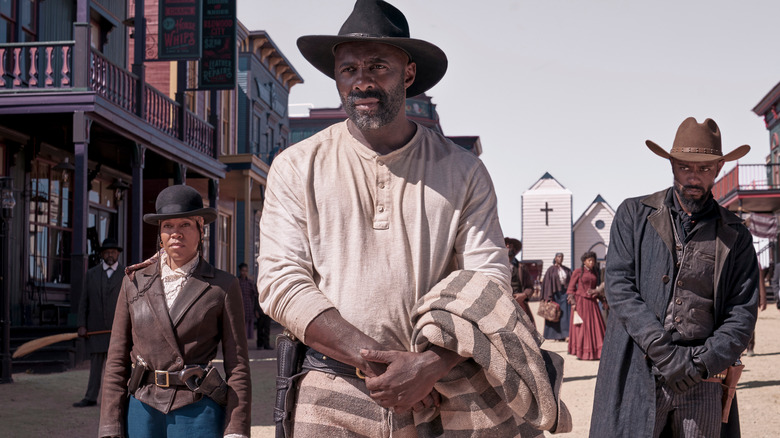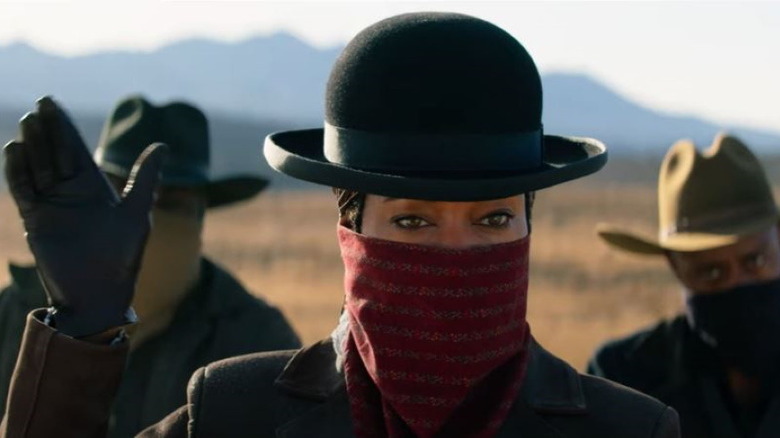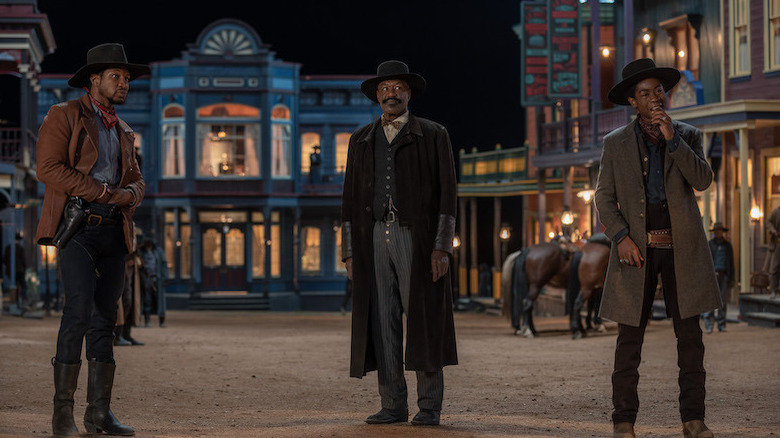The Harder They Fall Director Jeymes Samuel Is Reclaiming The Old West [Interview]
Jeymes Samuel is coming out guns blazing with his feature debut, "The Harder They Fall." After assembling a cast of superhero proportions — including greats like Idris Elba, Jonathan Majors, Regina King, Zazie Beetz, Delroy Lindo and LaKeith Stanfield — the director took on the complex task of adapting his favorite genre. Western cinema has enamored Samuel since childhood, though he always knew there was so much missing. Black cowboys and lethal frontier women were staples of the Wild West, but rarely the focus in Hollywood. And Samuel is just the man to change that.
"The Harder They Fall" takes western genre staples and remixes them with stylish flair and swaggering beats. Bold and dynamic, the film creates what Samuel and his cast have dubbed "the New West." Deadly shootouts, life-long rivalries, touching love stories and grand heroics persist in this reclamation, infused with rhythmic promise and experimentation. As for those who don't think of Westerns fondly, Samuel disagrees, arguing, "It's just what you've been given by westerns, you don't like." With "The Harder They Fall," he hopes to change your mind.
In anticipation of the movie, /Film spoke to Samuel about his love of the Old West, the process of bringing his dream to the big screen, and where the story goes from here.
This interview was edited for length and clarity.
"People just never had a voice."
So, this was really, really fun to watch. Especially because Westerns are so much about, "this is quintessential America" and "these are our roots." But as you've said so many times, that's a lot more complicated for Black people, for women, for people of color. So, for you, is that what the New West is supposed to represent?
For me, that is exactly what the New West is supposed to represent. I would say that's what the Old West was also. Obviously, there weren't people of color working in those power positions in Hollywood when a lot of the westerns were being made. There weren't a slew of Black directors working in Hollywood, getting big budgets and big movies in the 30s and 40s, and 50s. Even though there were pockets of Black people actually making films and making westerns, like The Bronze Buckaroo with Herb Alpert and stuff. And those are old, old, old movies. But people just never had a voice. There wasn't a slew of prominent female directors working in the 40s getting big Hollywood projects. So we wouldn't have female voices to give us a more accurate depiction of the Old West. It didn't happen.
For me, I love westerns so much, even though they fed us those storylines through a really narrow scope. I still love the westerns. I still love the genre, I loved the horses, I love everything about the saloons and just all the quick draws and the High Noon, Gary Cooper. I loved all of that stuff. I just thought they could be much more. Growing up, I would read as much as I can and find out about all of these real life characters, and read as much information as I could get on them. So it was just literally, almost like breathing for me to have my debut film be a Western with all real characters and just try to bring balance to the force.
You've said it took a lot of research to figure out how to bring them all to screen. So then how did the cast come together and how did you know who would embody these characters that you spent so much time with?
Well it was interesting because I wasn't making a biopic, I was making a fictional story. So what I wanted to do was get the people that were embodying the characters in the story. For instance, the real Rufus Buck was executed at 18 years old.... Idris Elba is not 18. The real Cherokee Bill, he was super, super fair-skinned and could pass almost for white, right? He was of mixed ethnicities, but he could pass for white. LaKeith can't. So, it wasn't necessarily about casting for historical accuracy, it was literally just for this tale I was telling, so we could watch it, enjoy all of these people that we've never seen portrayed before, and all these people that everyone said never existed. And at the end of this movie, know that they all existed and just go and research, and see what they really looked like, who they were, how they lived, and just find out all of this information about them.
I think "The Harder They Fall" is wicked, because it does all of that. Where are you going to get a movie where you have Bass Reeves, Cherokee Bill, Nat Love, Bill Pickett, Stagecoach Mary, Gertrude Smith, Jim Beckwourth, Wiley Escoe? Wiley Escoe has never been depicted in the history of any type of film! So you have all of these in one fell swoop, just so you can watch this film and go, "Wow, these people actually existed." And go and do your research and stop saying we were slaves in the Old West, it's incorrect.
Was that always the plan? To pull them all together, through time, and throw them into the ring together?
That was always the plan. Always, since I was a kid, I used to go, "Man, I'm going to make a Western one day. It's going to have all of these people in it." Because people would argue with me that these people existed. I would see arguments on YouTube. I shot a short film a while back, like a decade ago. I cast Erykah Badu, as Stage Coach Mary, and people would be arguing like, "These people didn't exist," but now people are talking about what they look like. It's a beautiful thing. I'm like, "Ahhhh. Finally, we're done." It's awesome. Awesome.
"We were literally living in the Old West."
Once we get them all together, we get a bunch of these really cool pairings — Rufus and Nat, Mary and Trudy, and Beckwourth and Bill. What do you hope that they bring out in each other?
I think they all just bring out magic in each other. One, because everyone kind of knew the mission statement. Everyone knew they were doing something really important. And we were shooting in the eye of a pandemic, so we were in a bubble and all we had was each other. So we were literally living in the Old West. We shot on location. There's no sets, everything's on location. All of these buildings, we built whole entire towns. So we were kind of just living amongst each other, living in the old west as it were. And the magic was just brought out of everyone, they were all just feeding off each other. And I'd blast music on set — this is my debut film, so I don't know the rules. All I know is when I walk, I need music. So I'll be blasting Dennis Brown's "The Promised Land" as they're riding their horses into Redwood, I'll be playing the music that's going to be in the film, on set. And we were just jamming the whole time. The whole thing was magical.
Oh, I have to ask you about the music. I don't even know where to start, but did you know that the movie would be this musical and what it would sound like? Or did that change once it started coming together and Jay-Z came aboard?
No, Jay-Z was aboard this movie from when I did "They Die By Dawn," before I wrote the first word of the script. And I knew what music it was going to be. It was a mission to find the signature of the melodic landscape. This movie is a mission. It took me probably a year or so, just exploring all different types of things, like dub, old school reggae. When people are talking, you hear the motif of Redwood and the Rufus Buck gang and it's [hums the melody]. And I composed the whole score and wrote and produced the entire soundtrack, so I knew what I was going to do and where. And when I looked into dub, I was like, "Hmm, we have lift off. Let me just shoot this movie and blast off on this planet we call earth." And that's what we did musically.
Yeah, it really translates! How were you thinking about the music when it came to the fight scenes or the standoffs? I feel those are always a little musical, but in "The Harder They Fall" it feels especially true.
I always say I see music and I hear film. So I knew when it came to the fight scene, I was going to do something super special. My ethos is two things. One, I'm always striving to do something I haven't seen before, because if I've seen it or heard it before, then what's the point in doing it, I can just watch that, I don't need to service the population with something they already have. That's rule number one, I want to do something different. But rule number two is obey your crazy, whatever I'm doing, obey my crazy. The thought that comes into my head first is the thought I'm going to pursue. And I knew that when I have collisions in this film, I wanted it to be super crazy.
So I'll bring in something like Fela Kuti into the Old West. Fela Kuti is a west African Nigerian God! He's one of our Gods! And I would have Barrington Levy sing [starts singing] over the horses galloping. And I would be making myself go [gasp] and I'd be cooking it. Like as we're filming, I'll be going back to the house and making this music, and I'll guide vocal it, and contact Barrington Levy and see if he'll do it. Then, he'll come in, sing on the score, and I know I've given an offering that we've never ever had in culture — in Black culture, white culture, whatever culture, just culture in general. To bring Barrington Levy, and Fela Kuti, and all of these people to the Old West, and it be sonically intact, is really a beautiful thing for me... I love my movie! [Laughs] I love this joint.
I love your movie too. So-
Thank you.
"I'm always going to go to the Old West"
Was there a lot you learned from doing "They Die By Dawn" that you brought to this?
Yeah, yeah. A lot. There's so much lessons I learned from shooting the short film, "They Die By Dawn." Just little things like be careful of people's allergy to horses. I'm allergic to dogs and cats, and a horse comes and I'm sneezing all over the place. Okay, now you have to be mindful of the actors' allergies to horses, if any. When you're shooting the horses and you're shooting horses in action sequences, you can't overwork the horses. It's almost like you're shooting a film within a film. So just that thing alone was a masterclass. But the big lessons I learned was through shooting in a pandemic. For all filmmakers, just shoot, right? So when you start shooting, that's the best masterclass you're going to have, because you're going to learn as you go.
But what you will never ever be prepared for in the history of cinema... Film is a 132, 133 years old. I think the first film was a six second movie called Roundhay Garden Scene. It's six seconds, right? In 1888. From 1888 to 2021, shooting in a worldwide pandemic is a whole new state of, as we say in Nigeria, wahala. It's a whole new state of fears where you are literally having to twist, turn, test, stay six feet, wear your goggles, wear your mask. The whole thing. You're making a movie in this and you are learning more and more lessons by the day about filmmaking, and the human condition, and how we communicate and protect each other and treat other through a pandemic. That teaching was unreal. That's why I learnt most of my lessons.
So, if "They Die By Dawn" was part one, and now part two is complete. Does the story continue? Do you plan to keep playing with this genre and with these characters?
I wouldn't necessarily say They Die By Dawn was part one. But you're right, They Die By Dawn was part one of, let's say Jeymes' foray into the Old West. But it was a short film, so really "The Harder They Fall" is book one. I'm always going to go to the Old West. I've always imagined "The Harder They Fall" as a three-parter, as it were, a prequel and a sequel. And I've always wanted to flesh out that story, but I'm always going to go to the Old West. I love westerns too much. I can't do nothing about it. I try, but I can't. I feel like John Malkovich in "Dangerous Liaisons" speaking to Glenn Close about his love for Michelle Pfeiffer. I tried to kill it, but I can't, at present. It's beyond my control. It's beyond my control. I love westerns.
So did this movie always end the way it did to give you a way into the next one or?
Without spoilers, "The Harder They Fall" always ended the way "The Harder They Fall" ended because I'm coming back, I'm coming back. Like those zombies that won't go down [mimes gunshot noises] "bam, bam, bam". But they keep coming, "bam bam bam bam bam," they keep coming. That's me with the old west.
And also, when people tell me they don't like westerns, "I don't like westerns. I don't like westerns". Yes you do. You like stories, right? You like film, right? It's just what you've been given by westerns, you don't like. Watch this teaser, watch this trailer, and tell me you don't like westerns. It was like, "I told you". So, with the cowboy and the cowgirl aesthetic in cinema, my ethos is like Vera Lynn, [sings] "we'll meet again, don't know where, don't know when, but I know we'll meet again one sunny day." I'm coming back, and back, and back. You know what I mean?
"The Harder They Fall" is now playing in theaters and arrives to Netflix on November 3, 2021.



